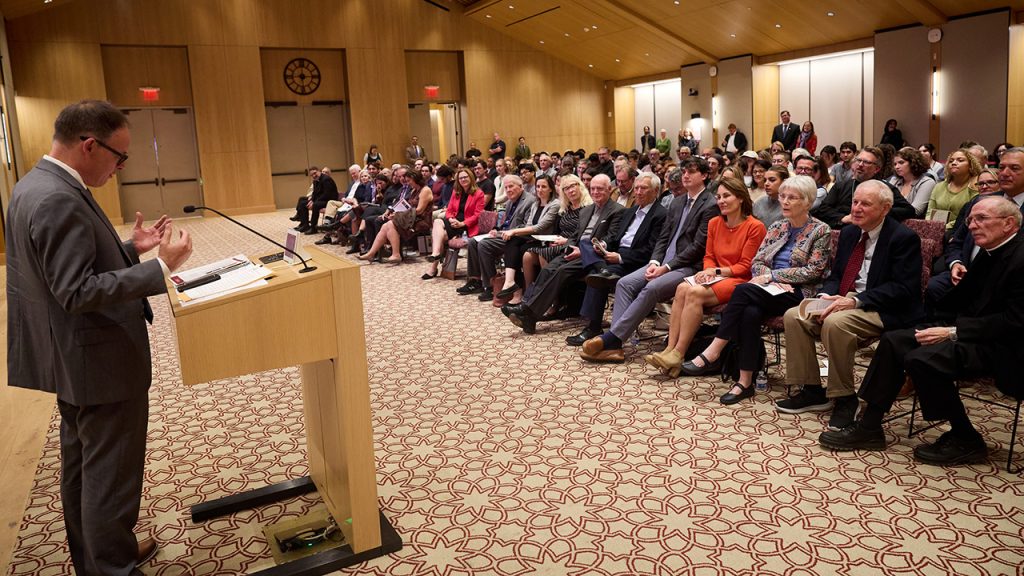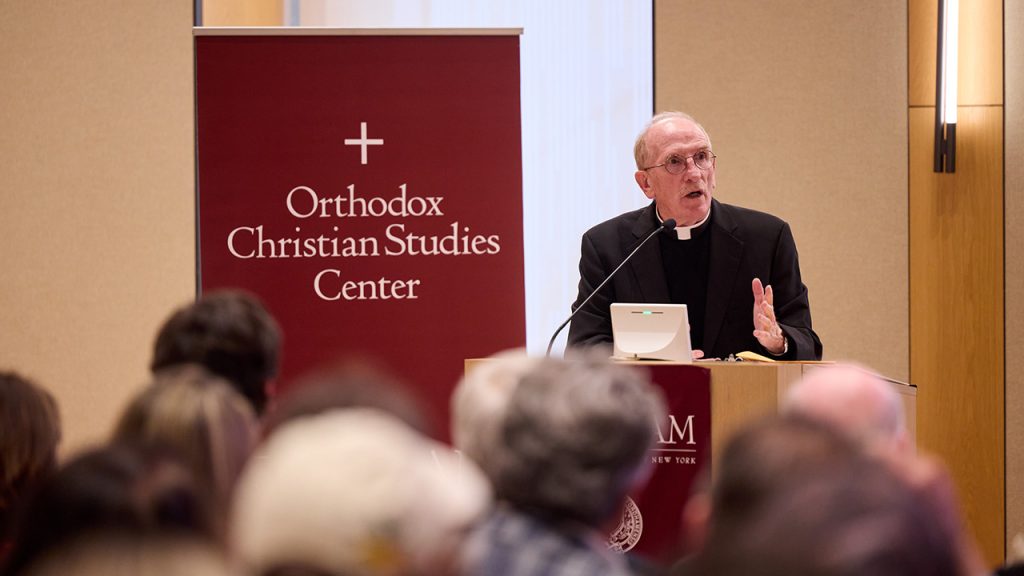How should the two biggest Christian denominations in the world mend a centuries-old rift and bring themselves together? The answer lies in an “alliance of grace” focused on serving humanity, said Joseph M. McShane, S.J., president emeritus of Fordham, in an Oct. 1 lecture at Fordham.
“At the end of the day, my friends,” he said, “it’s really all about bringing the Gospel to life.”
He delivered the annual Economos Orthodoxy in America Lecture—one of many initiatives of Fordham’s Orthodox Christian Studies Center—at the Joseph M. McShane, S.J. Campus Center, named for him in 2022 to honor his 19-year tenure as president. Father McShane spoke to a packed house and received warm accolades from former colleagues and his successor as president, Tania Tetlow, who told him “it has been the honor of a lifetime to attempt to fill your shoes.”
In his address, “Building an Alliance of Grace: The Work of Ecumenism in an Age of Anxiety,” Father McShane spoke of efforts by Pope Francis and His All Holiness Ecumenical Patriarch Bartholomew to overcome the divide between the Catholic and Eastern Orthodox churches. Known as the Great Schism, it dates from 1054, when religious disagreements and political conflicts drove the two churches apart.
From their words and actions, Father McShane said, “I think that it’s fair to say that the patriarch and the pope believe that we will find unity in the apostolic work that we do far more easily and convincingly than we can find in theological discussions and debates.”
Bringing Faiths Together
Both leaders have been working together “for the sake of God and suffering humanity,” as shown by their work on environmental and ecological issues, and seek to include other faiths—Islam, the Anglican church, and others—in their work, Father McShane said.
Such an alliance has a role to play in addressing world issues that, he said, are “moral at their roots” and not solely questions for secular political leaders.
“They cry out for moral answers of the sort that can only be offered by the members of an alliance of grace whose lives have been touched by God, and whose hearts have been transformed by grace itself,” Father McShane said.
Both Pope Francis and Ecumenical Patriarch Bartholomew are leading in this direction, he said. They “always call us to take up the task … through lives not of conspicuous consumption, but lives of conspicuous compassion, for that is what will turn heads and hearts to God,” he said.
“This is what the early Church was about: Living the Gospel message with such generosity of heart and such fullness,” Father McShane said. “It was a shock to the ancient world. People would love one another, go out of their way, they would give things up for one another. This caused people to stop and ask the question, well, why would people do this? Is it worthwhile? Is it the right way? Is it ultimately the truth?”
The Lived Gospel
“The lived Gospel changes hearts and minds, stops people … in their tracks, and attracts people to the message at the heart,” he said.

Father McShane was introduced by Tetlow, who said she was thrilled to carry forward the legacy of the Orthodox Christian Studies Center as a “center of ancient intellectual and religious tradition.”
A New Space for Orthodox Christian Studies
She also announced that Fordham will provide a long-sought home for the center in two adjoining buildings on Belmont Avenue, near the Rose Hill campus. Tetlow gave thanks to two major benefactors of Orthodox Christian studies at Fordham, Solon and Marianna Patterson, seated in the front row, who will provide a $1 million matching gift toward the costs of renovating the buildings.
Watch the entire lecture:

